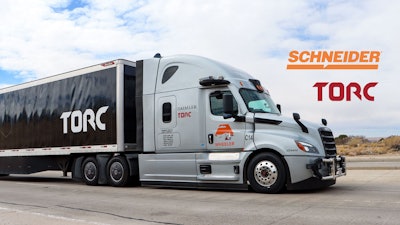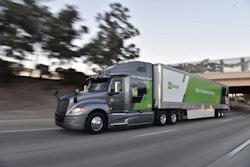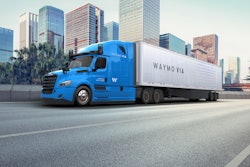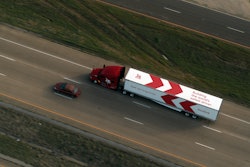Trucking news and briefs for Wednesday, Sept. 21, 2022:
Schneider partners with autonomous truck developer Torc Robotics
 Schneider is partnering with Torc Robotics on autonomous truck development.Torc Robotics | Twitter
Schneider is partnering with Torc Robotics on autonomous truck development.Torc Robotics | Twitter
“Schneider is an undisputed leader in the industry,” said Michael Fleming, Torc founder and CEO. “Many of trucking’s best practices and breakthroughs stem from Schneider’s forward-thinking approach. This relationship with Schneider is a significant step for the operational development of our product as we continue to work toward a seamless integration with the existing freight industry.”
As part of the agreement, Schneider will provide freight loads for Torc’s pilot operations and unique insights on truckload freight that will help guide the development and ongoing commercialization of autonomous trucks for long-haul applications.
“We see great potential for Torc’s autonomous technology to improve freight efficiencies while helping to lower cost,” said Rob Reich, Schneider executive vice president and chief administrative officer. “Schneider is looking forward to providing Torc with the industry and operational knowledge needed to maximize the potential of autonomous trucks.”
Torc recently announced the formation of its Torc Autonomous Advisory Council (TAAC), which includes key freight industry players such as Schneider. The latest agreement with Schneider will be multi-phased, launching from the initial scouting work that the companies have already completed.
Through Torc’s Test/Discover/Iterate approach, initial evaluation has commenced to ensure Torc’s systems are achieving the necessary requirements for Schneider and its customers. The next steps include system integration and day-to-day commercial operation pilots throughout 2023 and beyond. The end goal of the effort is to hone the product trajectory into an industry-guided usable solution.
Shippers’ conditions turn positive for first time in nearly 2 years
FTR’s Shippers Conditions Index (SCI) improved in July into a positive range for the first time since September 2020 at a plus 4.5 reading from the -4.0 in June.
The marked gain in shippers’ conditions during July was primarily due to the loosening of capacity utilization and sharply lower diesel prices, FTR noted. The outlook is generally for shippers’ market conditions to be weaker than they were in July but better than they have been during most of the pandemic. “Sharply lower diesel prices helped push the Shippers Conditions Index into positive territory, but there are unlikely to be similar sharp diesel drops in coming months,” said Todd Tranausky, vice president of rail and intermodal at FTR. “Additional positive momentum in the SCI will be driven by more capacity becoming available.“
Steering issue prompts recall of Western Star trucks
Daimler Trucks North America is recalling approximately 202 model year 2022-2023 Western Star 47X and 49X trucks, according to National Highway Traffic Safety Administration documents.
The recall says the u-joint pinch bolt on the steering shaft in the affected trucks may detach, which can cause a loss of steering control.
Dealers will inspect and repair the joint, as necessary, free of charge. Owner notification letters are expected to be mailed Nov. 11. Owners may contact DTNA customer service at 1-800-547-0712 with recall number FL952. NHTSA’s recall number is 22V-681.
Amazon bringing low-carbon electrofuels to trucking fleet
Amazon has signed an agreement with renewable fuels technology company Infinium to begin powering Amazon’s transportation fleet with ultra-low carbon electrofuels beginning in 2023.
Infinium is expected to initially supply enough electrofuels, which are a fossil-based fuel alternative created with carbon waste and renewable power, to begin powering Amazon trucks in lieu of diesel fuel for approximately 5 million miles of travel per year.
Amazon plans to initially use the electrofuels in trucks in its middle-mile fleet in Southern California, where the trucks are expected to help serve millions of customers. Amazon’s middle-mile fleet is responsible for moving customer orders from its vendors and fulfillment centers to its network of sortation and delivery stations.
To start, Infinium plans to build one of the world’s first electrofuels-production facilities in Texas. The facility will use renewable-power-generated green hydrogen and approximately 18,000 tons of recycled carbon waste per year to create the electrofuels.
“Infinium’s electrofuels can help Amazon reduce carbon emissions across our transportation fleet, which is important to both us and our customers, and will help us move closer to our goal of net-zero carbon by 2040,” said Kara Hurst, vice president of Worldwide Sustainability at Amazon. “We’ve supported Infinium’s technology through our Climate Pledge Fund, and it’s exciting to see our investment turning into usable fuel that will help us, and others across the industry, decarbonize transportation in the long run.”











